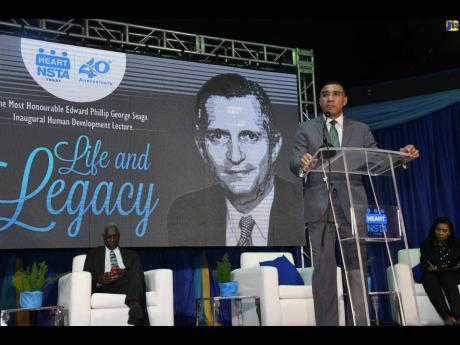Holness: Jamaica still failing students, businesses
The education system continues to fail Jamaican students, in much the same way that it did 40 years ago when former Prime Minister Edward Seaga was forced to establish the HEART Trust in order to give most of the country’s at-risk youth a second chance to get a trade or profession.
Prime Minister Andrew Holness made these remarks while delivering the Edward Phillip George Seaga Inaugural Development Lecture ‘Life and Legacy’ at the Alfred Sangster Auditorium, University of Technology, last Thursday.
“You would also be thinking that the problem that sparked the creation of HEART still exists today. Our secondary-school system is simply not turning out the students at the level of education that makes them trainable to get them to the next step of the employer. It doesn’t mean that HEART has failed, what it means is that HEART is still relevant in today’s circumstances,” he admitted.
HEART was born out of a need to provide the skills necessary to support economic growth at a time when the Seaga-led administration was faced with an unprecedented decline in bauxite revenue. And 40 years later the Jamaican economy is still not diversified as it needs to be,” said Holness.
REVENUE FALLOUT
Describing the revenue fallout then as equivalent to the recent losses suffered by the tourism industry and global trade activity caused by the COVID-19 pandemic, Seaga also faced a systemic hindrance to economic development, having inherited an economy that was not fit for purpose, Holness said.
This view was informed by conversations with an industrialist who established a factory in Singapore at that time, who found their plug-and-play investment model so much more efficient and organised.
“You go and your factory is there, and electricity is connected and water is connected, and your labour force is waiting for you. That’s the level of organisation,” the businessman said.
The irony of the situation is that when the businessman went to fill out the necessary business form, he found that it was the replica of one he had filled out in Jamaica, when attempting to do business with the promotions agency, and queried the similarity. He advised that it was the only thing adapted from Jamaica’s economic development model following visits by Prime Minister Lee Kuan Yew during the 1960s and 1970s.
“The profundity of the point that I make is that we are good at some things. We are good at administration, (but) we need to get better at implementation. We are good at making the policy and documenting it and getting trapped in bureaucracy. What really mattered was that our Jamaican entrepreneur was able to turn up and turn the keys to his factory. In Jamaica, he would have had to fill out that form 20 times. That is what Mr Seaga wanted to change, but it got trapped into narrow politics,” Holness said.

